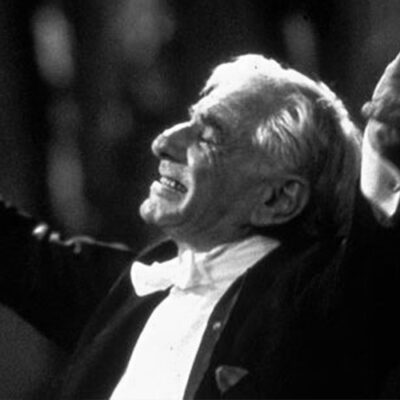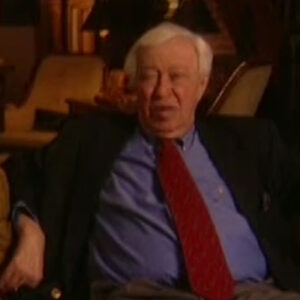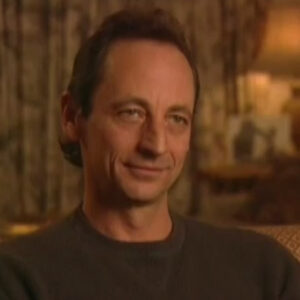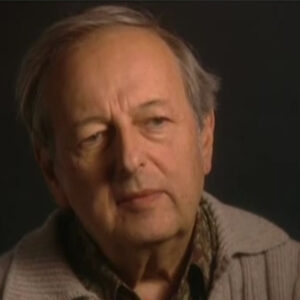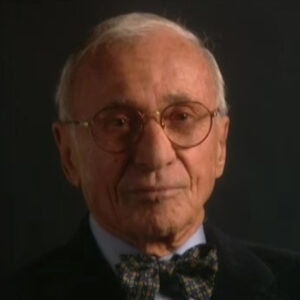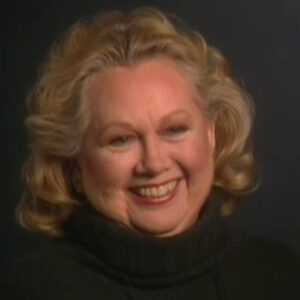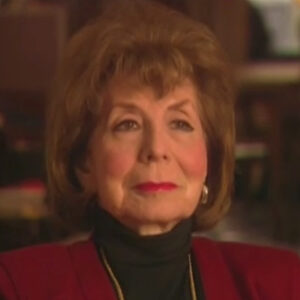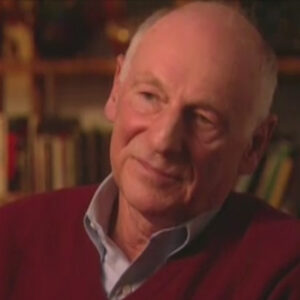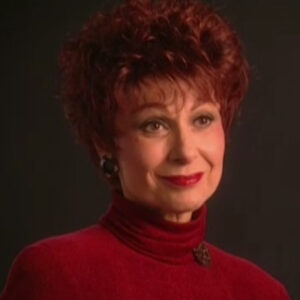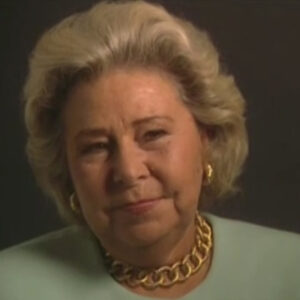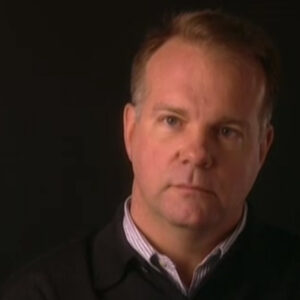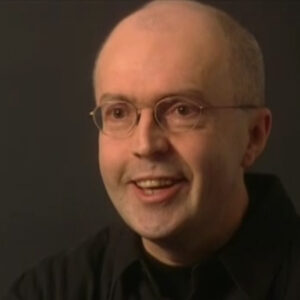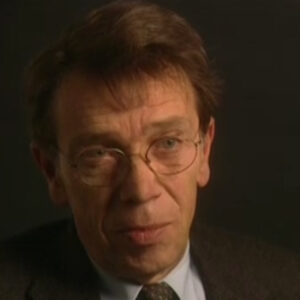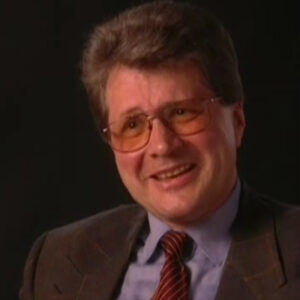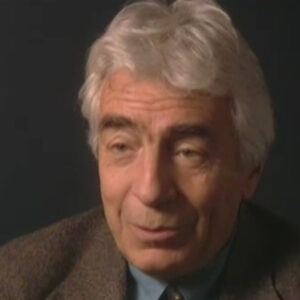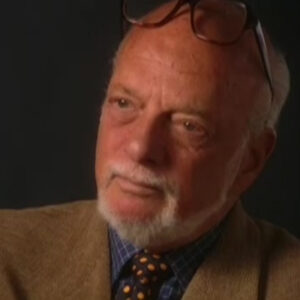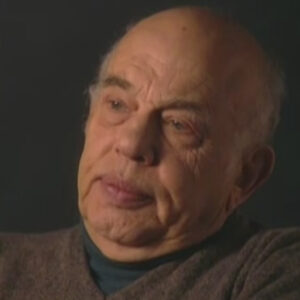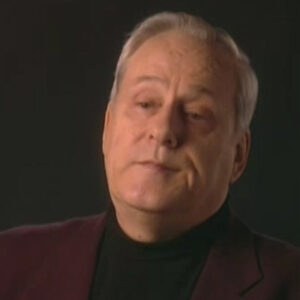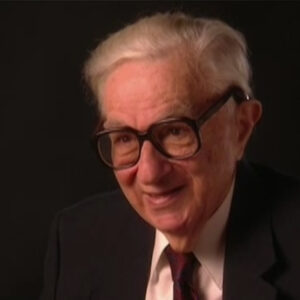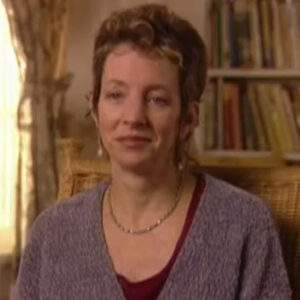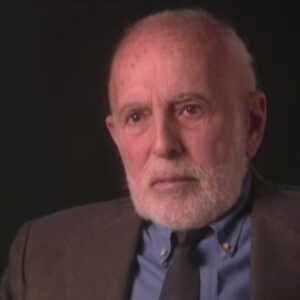Speaker Well, why don’t you just describe for us your first meeting with Lenny at Tanglewood in 1941.
Speaker How many impressions of them and what Tanglewood is trying to tell you, what they know, what tango is it just two sets? Well, you see, the trouble is that I was not a regular student there. I went up to visit some people in in that area. And my host said, you’ve got to go and play for Sanremo, who was a pianist for the Boston. So you’re going to be teaching at a time when you got to go play. And I said, oh, no, no, no, I’m not. You know, I studied and I went over and I played for him. And the next thing I knew he had called and Koussevitzky and Koussevitzky introduced me to Lanting and. We did perform together that I think that was in 1941 when I was four years older than Clinton.
Speaker And so I felt like he was my younger brother. What were your first impressions of you? Oh, Lenny was a dynamo from the beginning. And you could see him already, not only as a star, but as a teacher. Remembers working with with the student orchestra and what at that time seemed rather complex piece. And Leonard taught them. And in a way that was so different from the other teaching I saw that he could simplify a complex thing and immediately it would get the results. Wonderful to see. And of course, people were loving Lenny. He was very proud of the fact that people like Tallulah Bankhead, when they’d come to see it, that she would notice his back and how handsome his back was, that kind of thing. But Lenny was right in there pitching with everybody from the beginning.
Speaker She invited him back to her hotel then.
Speaker Oh, oh, I think so. I didn’t get invited with her. With him.
Speaker Yes, I’ve heard that story and like, showed up sometime the next morning, although I don’t know that he ever talks about what happened there.
Speaker But so he was always a magnet for people like that.
Speaker Do you have any specific stories about very specific stories about Lenny entangled in this?
Speaker No, I didn’t say I was. As I say, I was not a regular enrolled student. I was just there for that for sense of study. So I was they do count me very kindly as an alumnus, but I didn’t really get to run around with a lot of students, though. I knew Lucas was a youngster there than Lucas. False. And there were a lot of people that I saw on later in life in one place or another that had had their roots in Tanglewood, too. But at that time, I was not one of the gang.
Speaker So then you’re next.
Speaker Well, you well, we got to know each other enough so that when he would be doing he was caught doing things immediately after he finished his studies in New York. And and I can tell you a story from when he had the New York Orchestra or they call it the New York Symphony.
Speaker That was a well-known cellist. That was the first cellist of the orchestra and took great umbrage at the fact that Lenny had asked the everybody in orchestra to to audition for him. And he thought, how dare this little whippersnapper ask me to play for him? And he told me this himself. He said, I went in and I said, well, I will only play for you if you play for me, meaning a company. And I said, OK, which which of which of the big cello sonatas would you like to play? Brahms, Beethoven. And when he said, well, let’s do the Brahms, I made Major and said fine and with no music, sat down accompaniment minute for his audition.
Speaker He said from that moment on, I knew this was looking me and there was no more question about whether you should audition.
Speaker But Leonard did this kind of thing constantly. And what he didn’t say was that he had been an accompanist for one of the cello teachers.
Speaker So he had gotten to know a little bit of the repertory that way.
Speaker But even so, it’s very impressive that his memory was a good one to talk about his memory.
Speaker I mean, everybody says memories, you know, like beyond explanation.
Speaker Yeah, well, let me see if I, I, I’d hate just off the top of my head trying to give you the story on it that would illustrate the best. But I give you one idea. There was one time when he was rehearsing one Mahler symphony. And they, as you know, a long, monumental he was performing another on the subscription series of that week and was and had another Mahler symphony, was during a festivity of some sort. Another one, so that within one week he had three big Malas, which he knew intimately. And he remembered people he remembered intimate things about people. I mean, he could remember conversations, he could remember the thing that would make his connection with a person very personal.
Speaker That’s the one in oh.
Speaker I don’t know if this is an apocryphal story, I’m going to ask Adolph about it, but so many people have told me this, that I’m beginning to think it’s true, that it’s hard to believe that Lenny went to when Lenny went to the opening of Kiss Me, Kate. Yeah. And the next day I was at a party and he played the entire score. And you all were getting great ones.
Speaker Yeah, they were there. Yeah. Did you ever see anything like that?
Speaker Well, you see, I’ve dealt with enough of the great conductors of the world, so I’ve dealt with some phenomenal memories.
Speaker Metropolis had a memory that was staggering. He I don’t want to go off on his stories, but I metropolis he conducted a big, monumental, long, very complex work called Cristoforo Colombo with the Philharmonic at Carnegie Hall.
Speaker It was I don’t know how many pages and pages long, but it ran into the hundreds and it was very complicated music and it had a big cast and.
Speaker They are coming and going as they tried to sort of set the stage it so that some one person would sing his part and get off the stage and then come in from the chorus, come into it. He thought, I will not have time and just a few rehearsals to be able to look at the score to see where it is. So he not only memorized the score, but he memorized the numbers of every measure so that if somebody said Measure 802, he right away could talk about the notes that when that measure. That’s amazing. It’s not only amazing, it’s something otherworldly.
Speaker And you were at the premiere Fancy Free. I was there at the premiere of Fancy Free.
Speaker Oh, yes, I was. Now, I never forget. It, of course, was just a wall period. And and everybody’s very proud of the service. And so everything was set for this to happen. But they were not prepared for the brilliance of both the dancing, the performance and of Lennon’s music. And of course, the place went berserk. I was in the moment and when that stage had that performance on it, that was the most excited audience I almost ever remember. Is that the first time you met Adolf and Betty? I don’t know. When I first met Batoff out of and often, but I seem to have known them all my life. But I just don’t remember when the first that probably was later. I’m not sure I may have met them before that. I may have a very bad heart and on them.
Speaker Can you describe it? This is a little bit off. That would help me as an introduction to just describe the relationship with.
Speaker Well, I don’t think I’m the right one to describe that because, you know, that’s that’s a very close, wonderful relationship working. I know that that when Lenny even mentioned or thought of at all and how fun it was, it was just suddenly now for the gales and laughed. It really cheered him. Then it could be very blue or down for whatever reason. I just the thought of it all could be and and that it was another kind of force on Lenny that they were so happy together. And the children love them, of course, and when adults would do something at the at a party at the house and the kids were growing up, it was a surefire way to make the night a great success. But that’s how others would have seen them together, perhaps more in those earlier days even than I did then. Here to talk about the logistics from international news, oh, the first music festival after the war, after the war, they decided to have a big international festival in Prague and the eye at that time was in charge of the first international music program at the State Department. And the Czech ambassador was coming back desperately asking for the State Department to send some performers there because Russia was sending its top artists.
Speaker They were sending Mravinsky, the great conductor. They were sending Oistrakh the violinist. They were sending Obering the pianist. They were sending Shostakovich, the composer, France, or sending it to stop. Once England was sending its top winds and there was no water from the United States. And unfortunately, in those days, the State Department didn’t have they had a policy against sending a performing person abroad. They would send teachers. They could send composers. They said Aaron Copland and South America, they said, but they did not send a performer and I who just could feel the need for this thing very strongly on a personal basis, as well as for the sake of our country. I thought they’ve got to get Leonard Bernstein and some Americans into that. And so I went to Bill Clinton, who was then the assistant secretary of state, and told him the dilemma. And he said, well, we have got a policy, but somehow I’m going to find at least a thousand dollars to get Leonard Bernstein out of there. And I got almost the Gush Sherman senior at Jay Sherman, the publisher, to send Sam Barba, whom they published and went to Eugene List, who had been studying with my teacher Olga tomorrow, and my piano teacher. And Eugene had just he was the one that played the piano for the four Roosevelt and I. Was it Truman, I guess Truman and and.
Speaker And to think of his name, not Khrushchev, what was his promise of Stalin? And this is what happens at all ages. Remember the name? I’m so sorry. Is this gonna mess up? Your thing is all right. Perfect. All right. Before that of Khrushchev and and Churchill and this young American G.I., they pulled up out of the Reich somewhere and he performed for them. And it was, of course, a sensation over here and everywhere and made his name quite well-known at that time. So I went to G and said and he also started with August of my teacher. And I told him about this festival. And I said, it’s so important that some Americans be there. And he said, well, I’ve done enough in Europe now to where I realize how important and the ignorance they are about what we do in America in the way of music and anything in the arts. So he said, I have just made a film and I will take some of my profits from that and pay my own way. And he did blessed me with and the reports we got back from it were wonderful because they said that it was the hit of the festival. They did the Rhapsody in Blue, these three young Americans involved in this thing. And they said that it was the knockout hit of the whole Prague festival. But Leno, of course, was you can imagine what he was like when he was turned loose at that young, exuberant age. With something like that, you weren’t there? No, I couldn’t be wrong. I was what they call I was the head of the arts, like the music section of the State Department. This was an international program then. But I didn’t have anything. We had we couldn’t do things like this. We could send we were trying to get American music performed or was sending scores. We were sending all sorts of things to whet people’s appetites. And we were working out performance rights agreements with the foreign governments and and particularly in Germany and Austria, where things have gotten badly disrupted, disrupted during the war.
Speaker But.
Speaker What was your next traveling experience or touring experience?
Speaker Oh, good Lord, now that you jump ahead to the Philharmonic days. Oh no. With Lenny. Oh no, no, no, that’s right. I was a while. I was in Munich. I later on, I was in Munich. I had a wonderful assignment over there. I was what they call them. It was a civilian assignment, but it was attached to the Office of Military Government for Bavaria. This the 1948 I got there in January of 48 and we had everything that went on in civilian life in Bavaria. Which was the American part of Germany that was under the government control, everything had to be cleared through military government, including music and performances. I had one full time opera companies, including the State Opera, had various symphony orchestras and top conductors in that part of the world, which was coming alive by 1948. Munich was already a grand summer for musical performance by 48. Am I speaking too fast, by the way? I naturally talk too fast. But the skies as part of the Southern accent Hidenori and now he’s already planning the Israeli Philharmonic. Leonard had just been made, but he hadn’t been there, too. I mean, he hadn’t arrived for his assignment. May the music director for the.
Speaker Israel Philharmonic, and he was invited to Munich by Shote, who then had the Bavarian State Opera to conduct the state opera orchestra and a concert and the day that they were to have their first rehearsal.
Speaker And and there was still a feeling that Americans don’t know. They can’t do that attitude. The orchestra went on a hunger strike. And so it looked like there would be no rehearsal, but I did manage to get around all the buddies I knew and made them give me packages of cigarettes. We got enough packages of cigarettes to where we agreed to come to that rehearsal. The reason for the hunger strike was that the first flutist of the orchestra had fainted from hunger that morning. It was food was scarce in those days, but Lenny came and from that moment on, there was no question of any. And he not attending rehearsals or performance, except that on the day of the first performance, there was a transportation strike and the players lived miles away, some of them from the Opera House. And there were bass players. Some them would carry the instruments back and forth home. They would not just leave them at the hall. It was just not the kind of day when you did things normally.
Speaker And so then the the Jewish displaced persons that were camped nearby. Then I had a friend in one of those that came to me and he lent me his trucks and they brought the German orchestra and the play, the performance for Lenny. And the thing was such a success that night that when it was over there was the crowds were standing outside the entrance to the opera at the back of the stage entrance, and they carried Lenny on their shoulders through the streets. No kidding.
Speaker And it was a triumph for a young American, I can tell you why he then went and performed at the displaced persons camps that formed at the displaced persons camp.
Speaker Oh, yes, that was a very emotional thing. He went to two or three of them and there were thousands or two or three, two or three displaced persons camps and. There were at one of them, the one that I attended, I think that all of them, of course, I attended one where there were, I think in the thousands of people there who didn’t know the name of Leonard Bernstein, they didn’t know anything other than they were told this man is going to conduct the Israel Philharmonic is going to be their leader. And they piled into this by the thousands. And there was a horrible piano there with some of the Keisel, almost one off, a little upright, and they had two or three of their own players. And Leonard not only played, but he conducted these people in something. And he he could turn nothing into something tremendous. And he did it for, like the best just turned him into the magician he could be. And I’ve never known anything like the emotional atmosphere, the weeping of the crowds of people, the sobbing. And Leonard had done it. You know, he just brought out something that touched everybody. And I even heard the words were all in foreign languages, but I did the Yiddish, I did hear my name every once in a while and it took them a little. They’re like, oh, he played you know, he improvised things and he played some of Rhapsody in Blue. He did, you know, just anything they could pull together. It was a very improvised affair. But it didn’t matter. It worked.
Speaker Did he do any Jewish music and any Jewish music with which he was very familiar?
Speaker I don’t know whether he did. I don’t remember all the details.
Speaker I know that that the people from the displaced camp gave me a volume of Jewish folk songs that I’ve kept to this day that they said that had been brought from Russia and.
Speaker I mean, it was just I remember that it must have been extraordinary. Is it true that they gave one year of remembrance, a concentration camp, outfits or whatever?
Speaker Well, I don’t know that I think that could have been during the that could have come at some point when I wasn’t actually with him because we really had a lot to do with all of us that were involved and and any of it. And so we weren’t all together there a minute.
Speaker Yeah, I think they did. I mean, he wrote it in a letter to Howard Kurtz. Hold on to this, because this is a real memento. I think they gave him one stripe.
Speaker Well, so many things went on. I mean, I’m sure there’ll be many other things of that nature that somebody could bring up that was there because it it was rich in incidents. I’ll tell you. Did he talk about how he felt about saying, you know, you get this is 60 years ago or what is it, 50? That’s a long time ago, I think. Forty eight. Fifty six days. They didn’t know 50 years ago. So he did say no, he was he equally moved. Was he equally moved. Oh, Leonard was Leonard. But Leonard could take it all in stride. But he was certainly a move. There’s no question about it.
Speaker You couldn’t help but make it sounds phenomenal. I wish there was footage of that. We have had some photographs. You have. Wow.
Speaker You know, we’ve been out there, you know, and I actually have found somebody who was there.
Speaker But you’ve just told it so well, I don’t think I it but we there’s somebody who was there and she said just photographs she had anyway then were many after Munich is part of this tour.
Speaker I know Lenny then went from something like that to Salzburg and then he went, I can tell you a story that the person who had my corresponding job in Vienna told me that he went to Vienna, I believe, after Munich and said he got off the train. I guess it would have probably been the Orient Express.
Speaker He got off the train and at the top of his lungs and with big gestures and whatnot, he was singing and conducting Rosenkavalier. He was home in Vienna. His first time.
Speaker I had to be respond to this. I mean, this brash American coming in and bringing I don’t know how they did on that.
Speaker I don’t remember that. But anything he did in those days seemed to work. I know that later on. What the Vienna I just I just took him on as one of the heroes of all time. They loved him.
Speaker That’s an amazing story. Were you were you were you a part of that later? I mean, you must have been. No, because I didn’t have the benefit of my mind.
Speaker Yeah, I that was we I and then off and on during the period when he was in I went to I of course was at things like the West Side Story on and on the town and all those I of course Solantic those and went to concerts and I was conducting the city orchestra. I had once been a soloist with something called the New York City Orchestra, but that was a different personnel then. But it was funny.
Speaker It was both the same, but that was back earlier.
Speaker Let’s move to Lenny’s becoming the music director of the New York Philharmonic. Um, can you tell us about how that came about? It’s something about just get into there that he was not only the youngest of the director, but the first American conductor of a major symphony in the world. I mean, had never been in America. And this to me is an amazing story.
Speaker Well, it was very important from a great many standpoint to start over again, because I think that you saw it was certainly important for a great many standpoints that an American was appointed to this very prominent position as an American. It was important to just America as a whole, to the United States as a whole. We were very happy about the composers of America.
Speaker Felt at last, one of our own is here to represent us, because Lenny had shown from early ages a real being, really become a part of the American music scene and not only composed himself, but he was in there pitching with the other composer.
Speaker I can remember that he wrote Aaron Copeland, who was then very well known. He was he was a national figure, but Lenny was just still a student. But Lenny even wrote to Copeland telling him how he could he thought he could make a piece of his Bible and was that kind of thing. Lenny was, but he was not resented for it. He was taken seriously and paid attention to. But to have this young American had this orchestra was a wonderful thing for a great many people. And, of course, it turned out to be. Incalculably forward looking for the New York Philharmonic because it added on to a great era then with a period of great growth of experimentation, love of trying new things and of of reaching for different audiences and bigger audiences, and where used all the forces that Leonard became such a master of, he began to use them to not only his advantage, but for what really for the advantage of of music in this country. For example.
Speaker State television itself, it had.
Speaker Two series running simultaneously on prime time television. One was called Leonard Bernstein in the New York Philharmonic, and the other was the Young People’s Concerts, which were just fabulous and sold all over the world and translated into other languages. To hear Leonard talking Japanese in Japan was very funny. I mean, but it was the words he said in English originally. But when he first came to the Philharmonic, I suppose since we already then personal friends, I and I knew Lana, as I mentioned earlier, that he was a teacher and how good a teacher. I said, Leonard, you have got to do young people’s concerts with his orchestra. And then he hesitated a minute and thought a while. He said, Well, he said, I will if it could be televised. So reach enough people because he knew the kind of trouble that would be involved and put it together. And right at that moment, he picked up the phone call, William Paley over at CBS and said, I’m here and we’re discussing what I should do with the Philharmonic. And Paley said, go ahead. And that was the beginning. It took root right there. And that’s how the Young People’s concert started. I say at that time, it was amazing the way that adults took to them, just as the way children had, I said you could turn children and adults and adults and the children in the twinkling of an eye.
Speaker And it’s true because the young the grown people wanted to keep the children home so they could go home.
Speaker So everybody learned from those that were sometimes they would say something that would be controversial. It didn’t matter. I remember one time we were in I believe it was in Denver.
Speaker We were on tour. And we would one day just walking through a park somewhere on a little child, must have been five years old or something came up and struck Lenny. And Lenny was astonished because that was a non-violent man.
Speaker And Lenny said and the little boy said, You didn’t say good night to me. And then I said.
Speaker What he said, you didn’t say good night to me, you were talking about Marla, but you didn’t say good night to me, he remembered Marla, your mother, and I said, oh, you said, do you know that last show we ran over time?
Speaker And I didn’t get to say my usual goodbye to this kid had remembered it from months before and held it against him. Hit him.
Speaker Oh, that’s a wonderful story.
Speaker That’s amazing. I love that.
Speaker He really love that, I think. Oh, exactly that.
Speaker Oh, that’s a great story.
Speaker I, I read that once you said that you knew you had a feeling that because he had children, the young children of his own, that he was really writing these programs.
Speaker For example, when Lenny began doing the young people concerts, he had little children of his own.
Speaker And.
Speaker He was not only a teacher par excellence, but he had such made such fun for his own children to learn and. He, I’m sure, began writing those first young people’s concerts with them in mind, and so it just got exactly right to the age of the kids that we had in the audience. It just worked perfectly. As the years went on and Lenny had exhausted a number of the subjects that you might have taken up on television with children and his children got gradually older, that the level got of the other programs themselves got higher and higher. And after a while they were almost pitched to the high school age instead of the smaller kids age. It was funny to see. What are your own personal favorites among the young people? Don’t. I can’t tell you which of my personality they were. We did so many of them. I mean, I know a lot of them that were that seemed awfully good at the time. But did you have you seen any of them, by the way? Oh, you have? I haven’t seen them since they came out of their fresh air in my mind, I’m sure, because I’ve just looked at them all. Which was your favorite? Oh, goodness.
Speaker I love I love what I did on opera. Oh, yeah. Yeah. Brings it around and makes you understand like what is what opera is.
Speaker I love it, but you know, the way he just could hit the nail on the head with something that I remember his singing the Yellow Submarine, which is one of the and that that moment that was very ENSO that that whole audience immediately broke into and so sympathetic, whatever it was. Laughter Whatever.
Speaker He knew how to make it contemporary, always how to make it contemporary.
Speaker He had his impact on something like this, his van.
Speaker Well, I started a while ago. I was talking about the fact that he was extending through television, but that was just one of the areas, premises and recordings. He had a recording contract at a time when nobody had the same this kind of contract. He could he had the agreement that he could record anything he wanted to. And when you think of the expense of recording in those days, to have carte blanche like that was not only a great I’m beginning to lose words now of my old age.
Speaker He began to. I lose the place. I’ll be all right. It’s just that I do this now and I get tired and what we all have.
Speaker Oh yeah, you could call it anything that he wanted. And therefore, he did record a vast amount of the repertory.
Speaker You know, during the ten years that he was music director of the Philharmonic, he repeated very few people, even though he was conducting many weeks a year many, many programs he wanted always to be for his own sake. He wanted to be exploring new repertory. And so we at the end of his ten years, we I think we got all the beginning of the tenth year. We brought out one of the programs, a list of all the things that he had conducted during that time and the extent of it and the variety in it was was quite amazing to see. But he also recorded, you see, an amazing variety and extent of that.
Speaker And I don’t think that any other orchestra was able to do that at that time in this country. I’m not talking about abroad now, but in this country where recording was expensive, there’s no other one that had had that kind of contract. Then through touring, Lenny really extended the horizons throughout the world almost.
Speaker It was such fun to be with Lenny on tour because he would it was both fun and a killer because Lenny had boundless energy then and and would sit up all night and after concerts all over not only the receptions and ambassadorial parties and things, but he have to go out on the town to see who was doing the local color, where the local color was, see who was what jazz groups, and Poland, for example, where jazz was forbidden. You would have to go to a place that was off limits and and be there until dawn and then the next day and move on to the next place. He had limitless energy. It was a killer for the rest of us who were having to work the next morning at six o’clock and not just sleep it off, but Lenny got his energy back into many places by exercise and by his love of sports. He would he would see to it that he was taking water skiing somewhere or that he could go snorkeling in Hawaii or that he could go deep sea diving or whatever it might be, or he would go he would horseback riding in Alaska. But Lenny, was he he would he would restore himself by physical activity.
Speaker Helps tell that story where we were driving and flying over.
Speaker Oh, don’t mind me. That’s very kind of, you know, the story. And we were in South America and in those days as before the day of Jets. But we on the Lodge, we’re on a fleet of four planes. But we were in the plane that Lenny was I happened to be in this plane, too. And we’re flying over the high Andes so that below us with these jagged, wild snow covered, very high mountains, desolate areas and everybody’s astonishment and horror, we saw Leonard get up and head for the cockpit for the pilot where the pilot was. And I heard people say, oh, no. Oh, no. And then it went on for a long time, everything was fine.
Speaker And then all of a sudden the plane took an enormous drop and the concertmaster of the orchestra got seasick. As a result, it was terrified.
Speaker And sure enough, Lenny had talked them into letting him take the control for a minute and we plunged.
Speaker So it came out of the cockpit and you have to get on his face.
Speaker But I doubt it. I doubt if he was proud of that plunge. I know it’s almost as did everybody, including those pilots. I doubt that. But I thought to tell you about touring, there were so many angles. It’d be interesting to talk about it, I think.
Speaker The crowds that would try to get into the concerts, the places where people would sleep in the streets for days before the box office is what I was set up as box offices temporarily to get into the concert.
Speaker I can remember one place in America where, to our astonishment and we were very upset about it when we found that the people who put on the concert had sold the tickets to the first half of the concert to one set of people and to the second half to another, so that the first half of the audience had to get up and leave off, will make room for the other crowd of people. It’s not exactly kosher.
Speaker Had there been in America City, it will be fair to say. And if this is to incorporate this in your answer, then I’m trying to lead it. But would it be fair to say that that money was the first American conductor to have that kind of.
Speaker Well, then it was the first American doctor to have the prominent New York Philharmonic, which was in this country to have that post was was really history making. And it was, as I think I’ve mentioned, it’s been great of great importance to everybody we had.
Speaker I think, you know, amongst conductors, it’s an interesting thing in various countries, you don’t fire necessarily people of that country conducting.
Speaker Orchestras in that country find the music directors in England have come from Italy, they’ve come from Germany, they’ve come from wherever it might be in Holland, they will come somewhere. And this country, too, we always say that the and it was a different reason historically why that why we call upon Europeans more than we had.
Speaker Well, entirely. They come from from Europe, I guess, until the time of Bernstine, who also was a very young man when he took over. He was, I suppose, if not the youngest. He was certainly the second the youngest may have been the youngest of of of the music director of the Philharmonic. But there was something I had proven in a different way. He hadn’t conducted all the repertory. He hadn’t had the experience that many of the older men had had. But he had already proven himself an extraordinary musician, an extraordinary imagination with a vitality that was very American and with a love of people and of making people love him. That one just saw really and the thing had to work and it did work, the Philharmonic people, some people thought it was controversial when they heard about it, they said, you know, he’s too young to this. And it proved on all those fears proved completely unfounded.
Speaker In fact, it was just immediately it was the talk of the town. Now, I mentioned things like touring, and I haven’t told you enough about some of the tours. We made some very important to us. For instance, the year Glen took over, we made a seven week tour of Latin America. We’ve played in every country. In South America and some of the Central American countries, with the exception of the Guyana’s, we even gave free concerts in Paraguay and the heads of state came the we would be on the front pages of every newspaper and we’d be on every television and radio programs in some of the countries. The ruling hunters would come. There was a revolution that broke out. And in Bolivia, as two of our planes had landed and the other two were still back in Lima and couldn’t leave, and they were the arrival of a former president of the country was as expected at the same time that the Philharmonic planes arrived. That was the signal for this revolution to break out in the southern part of the country, and we didn’t understand all this and we thought all these crowds are there to welcome us.
Speaker And we saw machine guns on the tops of buildings as we rode from the airport down to our hotel. We just thought, well, this is some strange reception. And it was only then that we found out that this recession, the revolution had started. They were paving the area in front of their little opera house. It was not a very big one, seated 900 people. I think it was.
Speaker And they were paving the plaza in front of it and they were putting silver on all the lampposts around it to make an occasion of it. And while everything else came to a halt, they kept on paving this and putting this little on those things. And the concert came off. Everybody stopped the revolution during that. And 900 native Indians from Lake Titicaca had heard about this, didn’t know what it was to be, but they came around and tried to beat down the doors of the concert hall to get in. They wanted they couldn’t get tickets. They didn’t know about tickets. I think they just wanted to see what was going on. And I remember jumping out a window at the back of the hole to get off to where I could get to the telegraph wire the papers in New York about what was going on. But the touring with Lenny was always adventurous. Describe the homecoming from that tour to New York.
Speaker The city gave a big reception us down in front of city hall. And. It’s quite a homecoming. I don’t remember anything else about it, and it was just a big celebration. Did you have something that you remember that?
Speaker Well, it was it was covered for you. Oh, sorry.
Speaker I mean, I tell you a funny story, though, that our first concert took place in Panama on this tour, and then it was conducting and playing the piano, playing a concerto at the same time.
Speaker And somebody, well, some well-meaning but ignorant soul had come and put. Furniture wax of some sort on the keys to make them shine more.
Speaker And when Lenny started to play, his hands went in all directions and I had to stop it, of course. And they came out and with whiskey, they washed off the keys. And Lenny then continued with the concert. Do you think the most famous person, the president of the country was Lyle Lovett, the 1959 Russian to a lesser extent.
Speaker That was extraordinary in so many ways.
Speaker That, of course, one of the things that brought it to greater national attention was that was that. Pasternak came to one of the concerts, Lenny and Felicia had sought him out where he had been in virtual retirement and not heard of for year and he had come to the concert. Could you could you just go back?
Speaker This is important because he had been awarded the Nobel Prize. The Russians would not let him do it, but he had gone into seclusion and had been in seclusion, had made no public appearances for years and years.
Speaker Yeah, yes. Until this is that Pasternak Pasternak had not he had been given the Nobel Prize and the Russians had not allowed him to accept it. And that’s when he went into seclusion and hadn’t been seen for a great many years. And so it was a momentous occasion when he appeared at the concert. I believe that at that same concert, Shostakovich was there was a really momentous night. If we can, this is not for the cameras now, but I’ll tell you a story about Pasternack. Felecia Bernstine, he was sitting in her box and I have to go through the little corridor behind the box. And she came out of nowhere and she said over the next hour, I’d like you to meet Carlos Mosley and person except Carlos Carlos. Oh, oh.
Speaker He said, oh, I thought this man is a phony and didn’t know me from Adam, but he was just such a nice man. So, you know, I’m sorry to take up the time with a good story to tell. Well, I have a lot of footage of that. Oh, you did? Oh, yeah.
Speaker Well, of course, that made the television program to help you tell that story of that, because I think you do it.
Speaker No, you’re not going to have that. No, no, no, no, no, no, no, no, no.
Speaker Incredible. I mean, just incredible. Now, how did the Russians respond to that? Oh, it was a.
Speaker Glenn, it was really very much loved by the audience, just as Van Cliburn had been Van Cliburn had been there before we had, and so he had his friends, all the great musicians were in constant. Where they are and. They were coming, my tickets was very difficult on a certain number of people to get tickets, but as we walked through the streets, why he would be recognized by a lot of people, I learned a great deal about the reality of Russia, which I don’t think he’d been fully aware of until we got there. I remember when we arrived in Moscow. I play in that funny little man came up speaking British English, and so he would like to interview him for radio and I grabbed Lenny and he said he tried to take Leonella and another room and I grabbed Leonard and put it in the other direction. I said, Leonard, please listen. You know, you don’t know what that is, that I can handle it like that. And so I listened in on a perfectly innocuous, typical Bernstine kind of of interview and said things like, Mr. Bernstine, what were your emotions when you heard that you were coming to Russia? And like I said, I literally jump for joy and, you know, that’s plenty vocabulary. The next morning or several mornings later, we were all awakened in our hotel rooms at the Hotel Ukraina by a loud speaker system and we heard an English broadcast and we heard the same little man interviewing Lenny. And the questions had been changed. The question was, Mr. Bernstine, what were your emotions when you saw the living conditions of the Russian people? And I said I literally jump for joy. It was that I mean, we got one example after another that that opened the eyes of everybody to the perils of being in Russia, that. The story of one member of the orchestra who had talked about giving an overcoat to his brother. We had heard about this overcoat that he knew his brother who lived in Russia, needed an overcoat, we’d heard about this and heard about it. And the brother, when they finally got they said, don’t give it to me. I won’t be allowed to accept it. Don’t try to. But in some way, the member of our caucus was determined. And so they met on a lonely country road. So when they gave him the coat and when we got to the hole that night, the police were there with a coat handed at that time.
Speaker Because when they were just afraid of what this perception.
Speaker I don’t know you, I can’t tell you, but it’s a it’s a you know, we were all conscious of the tensions when we gave 22 concerts in 18 days in Russia.
Speaker And I swear, I gave 18 concerts and 22 days in Russia.
Speaker And they were very exciting concerts, I’ll tell you. Plus making a television program. I was talking earlier about, you know, about the crimes that led to two series at one time, his adult series, The Leonard Bernstein of the New York Philharmonic series, was not the average kind of in those days orchestra television programs. One was made in Japan, for example, back in 1962 of 60.
Speaker Sixty one in the Imperial Palace when people didn’t get into the Imperial Palace much, but there was an incident amongst the players of the traditional orchestra that also played in the Tokyo Philharmonic or something during their regular life. But there was trying to explain certain kinds of similarities that might be between Chaum players and oboe players in the American orchestra. But he made a program that was fascinating for international audiences and a spot that nobody else would have dreamed of in making an international kind of television program for just doing that program, that doing a program in and Russia for the youth. There had been an unusual kind of setting. We did another one in LA Phoenicia in Venice, the one that burned recently. And there was a chance to relate that kind of architecture to music of that period of time that the house was built and Lenin knew how to do those things so, so well. What about.
Speaker Just one more touring story to tell us about Warsaw.
Speaker Look, not where we got to Warsaw, I was eager to get to the I don’t know whether it’s the show powerhouse or the software museum or whatever, but they also passed piano and Lenny immediately had to play on that piano and he began playing Chopin on it. And then later that afternoon, I heard him practicing again, which he had not been doing right recently. On that, I began practicing solo words. He even played Albarado, Grazioso Ravel, and I’m still working on So what is he up to? And that night, that third concert we gave in in Warsaw was in the big Congress hall that seated large numbers of people. And the ovation at the end lasted a total of 40 minutes.
Speaker And of course, the orchestra played on course and they played on they gave out of whatever they could play. And Leonard dismissed the orchestra on the stage and then sat down to the piano and began to play Soaper and began to play. And I heard him play the rough Albarado little Grazioso. And everybody, of course, loved it. But it was an ovation, partly because of how good we were and how good they hadn’t heard many. This is remember in 1959, this was before the days of lots of international touring by the oxes and had to go into Russia. And then only one other American orchestra in Russia. I don’t think had been one or two in Poland only, so that it was a mixture of sentiment toward the United States and toward the free world. And all sorts of things were mixed in it. But then it was the personality that embodied the whole thing for them and to bring it into focus.
Speaker And again, it was a case of a wide number of people responding to the Leonard Bernstein.
Speaker Let’s talk a little bit. Let me ask you, what do you think about that? What do you make of that?
Speaker Now that that’s too hard question to answer now in a brief period of time. I don’t want to answer that, as a matter of fact, right now. But what makes him unique? But let me see if I can say some other things about.
Speaker Lenny was a beloved of the orchestra for many reasons, he was not a disciplinarian, he should have been more of one perhaps than he was. But he was. There was Lenny just it was not his nature, though I can tell you that sometimes after Lenny had had and born with things just as much as he could take and been very gentle about it, he could explode. But that was also, for him, very unusual. An explosion from Lenny was was not normal, but. He brought a great deal of additional income to the orchestra, all the television he was doing through the recordings they were making, through various things that were extra in addition to their their salaries and of course, the fact that we were playing. After all, had been there for a few years, we were playing on a year-round schedule and so we were playing to watch many more people in the end LA than a hall. And our income was, of course, a totally different kind of thing from what our income had been before. And so salaries naturally could increase for the Philharmonic. But the basic reason that the orchestra responded so well, then it was his musical instinct and knowledge and his love that came pouring out of him. And it was the kind of thing that drove some people that never went to concerts that occasionally would go there and see Lenny and see him emoting, but turned some people against him. But it was the same thing that the musicians carried musical meaning and not only carried musical meaning and carried emotional meaning. And even though those people play hours a day and hours a week and month in and month out, that is something they can respond to where something genuine leaps out of another person. They grab it and and it it makes them really want to play then had that quality with them and there were times when they had their ups and downs, but it was that was so minor compared to the big ups. And they could be so proud of him when they pull a rabbit out of a hat.
Speaker And they constantly they’re talking about the impact of Lenny on the concert series, the attention. Oh, I was just going to say that.
Speaker I have instead of talking about some of the peripheral things, I should have mentioned, that Lenny completely rejuvenated the main concert not just of the Philharmonic, but to the whole feeling about going to a concert after he’d been there for a short time. There’s enough controversy and enough both positive and negative that that had captured people’s imaginations. But Lenny was in the room, the full of the youthful fire that that was young enough and full of whatever it took to bring audiences. Into the concert hall and make them talk about music for a change. We had to add new series we had we we would charleton some what had been regular subscription series for years. We would shelton them to make room for additional people to come in and.
Speaker We went from the year I joined the Philharmonic, it was they had in one series, they had only 80 percent subscribed, which is a very sad financial situation for an opera. But some of the other series were better subscribe than that. But once one reach down to 80 percent, that was in Carnegie Hall. And within a year or so before Lenny came and we had left up to where we were 90 percent.
Speaker But once Lenny came in and we were moving to let them set up, by the way, which had all the excitement of a new concert hall and and the feeling that that another kind of music life was the beginning for some people. We went up to 100 percent.
Speaker And that was wonderful for for the management, of course, of an organization. It enabled us to do a great many things that you might not have any if we had had poor attendance, but then it was so full of the fire of youth and he was lighting up the the whole scene with that fire.
Speaker I’ve said enough, I’m not sure I don’t want to interrupt you.
Speaker Let’s talk a little bit about Lenny moves his moods very low and I think so generally.
Speaker Don’t let me tremendous mood swings. How did that affect his work with the orchestra? And how did you as good a personal friend?
Speaker Well, Leonard did have a he had moods. The remarkable thing is that they weren’t more violent changes in moods than they were, because when you think of the physical stress, he put himself on constantly and when you think of the different.
Speaker Aspects of the commercial, as well as the non-profit world that were being put on in the theater and musical theater, the music things, all these commercial interests plus the artistic interest that should be and were overriding the commercial interest. But the tension that that’s bound to create, plus the fact that Leonard didn’t spare himself physically. He loved to be up all night long and sometimes did very good work in the middle of the night. He liked to sleep late if he could, but there were times when he couldn’t. Well, you can see where on a few hours sleep, high tension, it’s bound to create mood problems. And the fact that Lenny survived that like he did with no brain damage done and then a few little bad moods might have created is a miracle.
Speaker Yeah, it is. It really is. And he lived hard.
Speaker Lenny lived hard. And for years he lived hard. And he did always he did things in spite of what people would advise him to do. Because all you had to do was to say to Leonard, don’t. And that’s what Lenny would have to do, is I don’t smoke. I think when I smoked, he did try sometimes to stop.
Speaker But in the beginning, Lenny was always going to do what was considered the impossible.
Speaker Forever. I was going to ask, well, I’m sorry.
Speaker Oh, you know, I’m running with, as you know better than a knife attack were by many for spreading himself too thin.
Speaker And what are your thoughts? Well, you know.
Speaker I was among those that, for selfish reasons, wanted them to be spread less thin because I would love to see them give full time to being a conductor, all composers, and just selfish because they meant so much to what I was so heavily involved in. I never tried to argue with him about. As I say, I think I had had enough sense not to broach it in an indirect way, but that from a personal standpoint, I would like to see Lenny. But at the same time one had to realize that he is somebody who was doing an incredible assortment of and variety of difficult things that nobody else was trying to combine in the way Lenny was and doing them simultaneously.
Speaker And you had to be so admiring of the fact that he could do it, that you couldn’t begrudge him, he was competitive. And.
Speaker It took lots and lots of forms that competitiveness. Sometimes it was all to the good and sometimes you was say, Oh, stop Ettlin, you know, but he it was just part of his nature. But he mixed that with a liking for people.
Speaker He wasn’t trying to put them down as people, but he just wanted to make himself safe. He couldn’t be the best of whatever it was. He said.
Speaker I think this may have been quoted in other places, but I remember he said to me that if I lived somewhere and there was a I knew there was a person on a mountain over there and I was on a mountain over here, I wouldn’t be happy until I got to know that person. Then I wanted then it was ready to love everybody else and they wanted everybody else to love him.
Speaker Do you have any theories about where that came from? Oh, no, I’m not that kind of psychologist.
Speaker I if I had them, I would not let myself in.
Speaker The third person who all said the same thing, you know, I mean, clearly, one, I have a really funny story, I tell you, that talks about this.
Speaker He said that when he came back from France once that he brought a pool up, score the pool, I could give it to him and I played it for you.
Speaker And I both started to cry when he looks at it very softly that the problem with you and I, it is that we want everybody in the world to love us. But the problem is you just can’t meet everybody.
Speaker I know that.
Speaker But Linda came to our meeting as many people as anybody else have, and this is something I’m very curious about.
Speaker And if you feel comfortable, I mean, I think you feel comfortable talking about it.
Speaker But the critics, many critics when I first started conducting, really lambasted him for his histrionics and his showmanship as his emotionality, his antics, his leading the audience and so forth and so on.
Speaker And I have two questions. One is, did it hurt?
Speaker When did he talk to you about it and to what was the problem? Why would critics have a problem with an emotional conductor?
Speaker And music is essentially an emotional.
Speaker Now, I’m not able to attempt to tell you why critics would do anything, because they are a mystery to me. But I would like to tell you about Linnet and those. Excessive, what might seem to some people, excessive motions or.
Speaker I want.
Speaker Because Lenny, when he was conducting on tour and conducting at the piano and. Conducting the orchestra at the same time and playing a lot of people would comment to me afterwards about the fact that he had to move around so much and all, it was distracting to them. And so I used it lots of times. They Lenni, please, can’t you tonight maybe hold out. But one night we were somewhere where I thought, well, maybe this won’t matter. I said, Lenny, as a personal favor to me, will you try tonight, will you just not do anything but sit still and play the piano and conduct and Blethen Hate did. And it was not a good performance. It was not is kind of music, and I went afterwards and I said, Leonard, do anything you want on the stage. I went to see Casals once down in Puerto Rico.
Speaker And Casals was, as you probably know, one of the most respected of musicians. And he had just recently heard that clinic conduct for the first time.
Speaker And he said, you know, I’d heard so much about Lenny’s gyrations as a conductor. I said, but when I heard him. I realize that every movement he makes carries musical meaning.
Speaker And that was a high compliment from. And it was something to think about.
Speaker Do you have other stories of musicians of that renown and how they felt about money?
Speaker Well, I don’t know that I’d go into that, but I can tell you that there were some times that then it got swept away with it. The point that it was a very big occasion at Carnegie Hall when Lennon was so excited himself over the whole occasion. That was when one of the great Russians had been allowed to come to this country for the first time. And Lennon was just pretty wild with excitement.
Speaker And and he began before it was over. He was he was just too excited. He was just pushed to be on it. He went and began re tying that bow tie, the other soloists and so on.
Speaker And so by the time they got on the stage, there was like it was overcharged. And so the first notes practive that came out, this pianist in the Tchaikovsky concerto, that there was great arpeggios there and landed on the wrong note of the.
Speaker And it was something that tennis would never have under normal circumstances. All this over charged atmosphere and Lenny himself a few hours later leapt into this thing and silence, fell off the podium, stepped off the podium. I don’t want to tell that story on that. Promise me you’ll get that. I bet it is funny.
Speaker Oh, everybody has a story about Larry falling off the podium.
Speaker Oh, they do. OK, well, then that’s not a good enough one, but it is one of them.
Speaker Milstein was Milstein was in the bath. Milstein was in the box with me when this happened and he just put his hand over his face like this and he had to leave. He said, I can’t take it. He had to get out of the car under the grapevine. What are some of them?
Speaker I don’t know. Oh, you didn’t actually answer the question of whether he ever spoke about how he felt about the about what I felt.
Speaker Well, I’ll tell you how he got in bed with one of the most prominent critics.
Speaker This person had been riding him unjustly and imputing wrong motives for this that they had done musically and so on, he was just but Leonard did make the mistake of owning a television program after a week of that.
Speaker So, I mean, one after one of those attacks, Leonard was on a television interview of some sort and he said, you know, it’s too bad when one of the most prominent of our critics attends an opera on the same night that I was there and said he wrote about how she sang the soprano of Sang Flat when everybody else in the hall knew she was singing Shab.
Speaker And that man never forgave him, was letting her fight back with the critics are able to kind of slaughter.
Speaker Well, nobody can, you know, no man wants to be unjustly attacked. And so I it’s just human nature not to be happy about it if it goes on and on, especially if it’s not true. So, you know, so often criticism was not necessarily well informed, just like the one I said she was not saying for himself, but. I think some of them never read the critics or they claim they never read the great line, I read everything and read everything, and I hated it because a lot of it he didn’t like a lot of it.
Speaker He rebelled was that it was unjust. And when Leonard went after nine years of conducting the Philharmonic, when he said, I’m not going to take on any other outside assignments, he took a year’s sabbatical and he went off to Europe and was just the darling of the gods everywhere. I think that he then thought, my, why do I put up with all that?
Speaker So if that had something to do with his decision to resign.
Speaker No, no, no, no, I think bottom line, I was probably ready to go to the thing. And I think that I think the big important decisions were not influenced by critics, but I think that that didn’t make the atmosphere. It made it easier to do, let’s put it that way.
Speaker So when he finally decided to can you talk about his decision to resign and how that came about, what he said to you and why he decided to step down?
Speaker You know, I don’t remember those exact. And of course, we have enough discussions over enough period of time to well, there was no just one point where I said I’m not going off. You know, I could have predicted that it was coming. But long before he actually said the.
Speaker Said that he was not going to come back.
Speaker And we I was not we were not we did not have anybody in the wings waiting to replace him, I can tell you that. And in fact, we had a year or two where we had to persuade George Israel to come and be our musical caretakers, so to speak, for a year or so before we put in a replacement.
Speaker What was the response of the orchestra to hearing here, Atlanta and stuff?
Speaker I don’t remember that. To tell you the truth, I’m sure that it was was a combination of sorrow and horror. You remember the last concert? I have heard literally hundreds and hundreds of Bernstine concerts, and I cannot tell you that that is not one of the things that I have cherished my memory of farewell. But I will tell you a wonderful concert that that historic the 25th anniversary of the Philharmonic occurred in whatever it was.
Speaker What year? Ninety thousand two hundred twenty fifth anniversary.
Speaker And I thought it might be a great idea to invite everybody who had ever been soloist with the Philharmonic, all the composers who had ever written anything for the Philharmonic and. We sent out invitations then to far and wide, and they came from far and wide and people they were still a lot of the old generation, the giants of the former age that aren’t alive today. There was still a lot of them that gave milk, came here from Ethel against. I came here from California. It was just there was a photograph made of this concert where the whole first third of the hall was filled with people that were historic figures. There was Benny Goodman, there was Stokowski. There was I won’t even begin to try to name. And of the composers, there was a big rush of the American composers, many of them, most of whom no longer I’m alive today, but some, of course, still are. And Lenny was the conductor that night. We did the same program with one word, Scholten, that they had played in 1842, the year of the founding of the Philharmonic. And on that was a work of a chamber word. And Leonard played the piano and that in recreating that tune.
Speaker And then at the end. The concert. Lenny says.
Speaker This is the anniversary of the Philharmonic. I just want them to play, and he left the stage and they played without Bernstine on and of course they played it off like gangbusters.
Speaker But that’s one of the highlights. Is that sort of a high salute for conductor to do that?
Speaker Well, it was well, I mean, he knew they could do it. And that’s a great conductor and had great orchestra. I’m sure he could do it.
Speaker But I wonder how many would do it and do it under these circumstances with the world. I can only describe the world of musical giants. So why are they. Well, let me turn it over to them.
Speaker To the animation of that concert was not to be believed because all the hugging and falling on the legs in the bow and the scraping the of people that hadn’t seen each other for years and years.
Speaker But they were the big boys, the big girls. It was really a very historic, very exciting, historic moment.
Speaker Sounds wonderful when I hear that there another musical highlight that comes to mind.
Speaker Oh, well, a lot of them I can’t think of one right now. That was we had Leanna’s conducted his own budget thousandth concert with the four who must have been one that was 10000.
Speaker I can remember that he was a phenomenal number of concerts, but I don’t think it was ten.
Speaker No, I think it was the event that something was it. It was some big number, though. Anyhow, we live in Israel in 68. No, I wasn’t I was not there in 68. I’d like to mention something, though, about when Lenny went over at the time of the Israeli war that Lenny was right there while the firing was still going on, the shooting, and he did a concert. With the orchestra there that was there, again, everybody described it as something very emotional and moving and with the sounds of the guns going. But Lenny.
Speaker This is so typical. He said the proceeds of this had to be shared between the children, not only of the Israelis, but of the enemy, too.
Speaker I didn’t know that. That’s interesting. That’s very interesting.
Speaker His politics were, I mean, a lot. How would you sum up his politics?
Speaker Well, how would you sum up the politics as a subject that Lenny and I seldom really got into? Because Lenny once said, you know, you and I should be running this country.
Speaker He said we should be the ones in Washington running it and accept that you have Howard H cancel each other out.
Speaker What do you think he meant by that?
Speaker What do you think? Well, Leno was ultra liberal about certain things, you know, and sometimes I thought it was low.
Speaker And so he you were very good friends with Lenny. I can tell that. And you may not want to try that, but it would be nice if you could tell me what you think drove Lenny.
Speaker What made what they a particularly what made him tick. What what was it really finally made him tick.
Speaker I don’t know whether I could do that with I’ve given that a lot of thought and I haven’t really thought what I would say about that. One thing we have not talked about is Felecia, his wife.
Speaker She was an absolute gem of James.
Speaker Delicate. Sensitive.
Speaker Brilliant in her way and wonderful, and she had a great influence, I think, on now and in what way? Oh, in many ways. But she she she represented a lot of things to Leonard that were important to him, but that had not been part of his natural approach to things.
Speaker She was she had a certain.
Speaker She hem them in in certain ways which she might have rebelled against sometimes, but always respecting it and also knowing he liked it.
Speaker I think he eventually gave in. We came back from 1959 to and Russia had been gone for 10 weeks. And he was invited to spend the night at the. I spent the night he was in because we spent the night. What I’m about to tell you, he had been invited to address the the Foreign Press Association and the next day, and he wrote a speech and Felicia read it and said that you cannot don’t get the wrong kind of speech. And Lenny got quite furious over it.
Speaker I mean, he just thinks that that’s what I’m going to say and so on. And she later came to me and David Kaiser, who was then the president of the Philharmonic, and she was in tears and she said, I know it’s wrong and said he shouldn’t do it. Can you have some influence? And we read it and we decided that we were going to try and we went at it with him and said it’s a mistake in our opinion. And why don’t you and Lenny stormed away finally and he really stormed away from Felicia, slammed the door. And the next morning he had set up all during the night and totally rewritten a total different kind of speech. And this speech he made for that association was of a brilliance you can’t believe. And it was completely different. And he knew it was right. But Felicia was the one that had, first of all, said no. That’s as good an example as I can think of, of of her doing something that was very important and he did get so much praise for that speech and I don’t think he would have gotten otherwise.
Speaker He had given what the speech was about. You mean the one that he didn’t deliver? I think he was delivering some negatives about the way lots of things were had to do with the governments and so on and so on. But it was not the right. It was not the thing he did do made a great impression. And it also made the Russians quite man. I’m told that it ran from articles, ran in the Russian press. He was saying, oh, and the speech that Kennedy was saying, what a relief it is to be back here with a free press in America. He said when I was in Russia for those 22 days, said how long to read about one tiny rate, forget and brought that a little bit that, you know, the Russians wouldn’t put anything that was left when they were being very.
Speaker Now, the speech he gave was a brilliant one, and it was one that they stood and and gave him a big ovation at the end, and that was a tough crowd of folks that were there at that press conference.
Speaker How did the orchestra how with the way the orchestra related to many different, let’s say, in the way they related to other conductors, its predecessor, Metropolis?
Speaker Well, Metropolis. Make no mistake, Metropolis is one of the most wonderful man.
Speaker And he was one of the great conductors, in my opinion, the great, great conductor. There’ve been some concerts with Metropolis I’ve heard that could equal any I’ve ever heard by anybody. Metropolis was also a wonderful man, and he was so good and kind with that orchestra.
Speaker He was long suffering with people in the recording world that would not give him the time to to rehearse that they would have given to other conductors. And simply because Metropolis was willing to say, all right, how do we know we’ll do it?
Speaker If you say five minutes, we’ll do it in five minutes instead of five hours. Whatever it was, Metropolis was amazing.
Speaker I forgot your question. Well, I want you to have it how differently the orchestra related.
Speaker Oh, all right. Right, right. I’ve got the orchestra with Metropolis. They they knew they respected him enormously as a great and brilliant mind musical genius. They knew that he was one of the kindest of man, the most forgiving of man. So they had a they loved him. Lenny, when you talk about his how different his relation differed from other conductors, Lenny had a personal relation with practically everybody he ever came in contact with. That was very personal and directed to that person as though they were the only person alive, Rick. He had private jokes with people. He had all sorts of things that related specifically to him and that person. That was amazing to see the hundreds of people throughout the world that Lenny was like a private special friend of other.
Speaker The same thing with the orchestra, Leonard’s relationship differed completely from anybody else that I’ve ever seen with, and that was a there was a Leonard was Leonard to them. He was a it was one of them. In a way, though, he didn’t really like them for a long time. He resented being Lenny, that no matter how much you said to him, Leonard, that’s a term of endearment and damn what they call Ike Eisenhower. I know they don’t mean that, but they call you Lenny.
Speaker That’s a great compliment when they call Metropolis. Maestro.
Speaker And they’ll I’m sure they would have called anything other than my throat and Zubaan, I expect they call Zuman Zubaan was also very you know, he could be there, but but Lennon’s relationship was unlike anybody else’s. And it take a long time to develop that idea. I mean, to develop what differences there might be.

